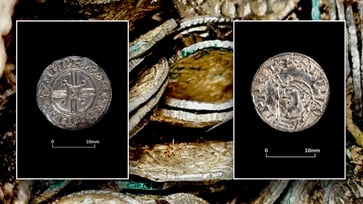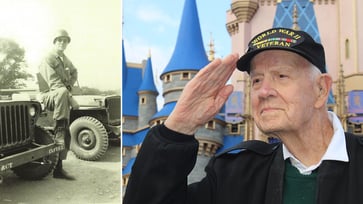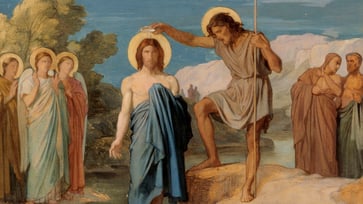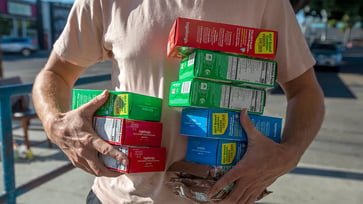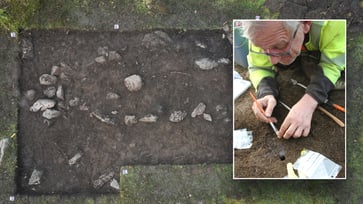St. Maximilian Kolbe, the patron saint of prisoners and drug addicts, is profiled by Martin Scorsese.
The Auschwitz priest's story is featured on Fox Nation's 'The Saints'.
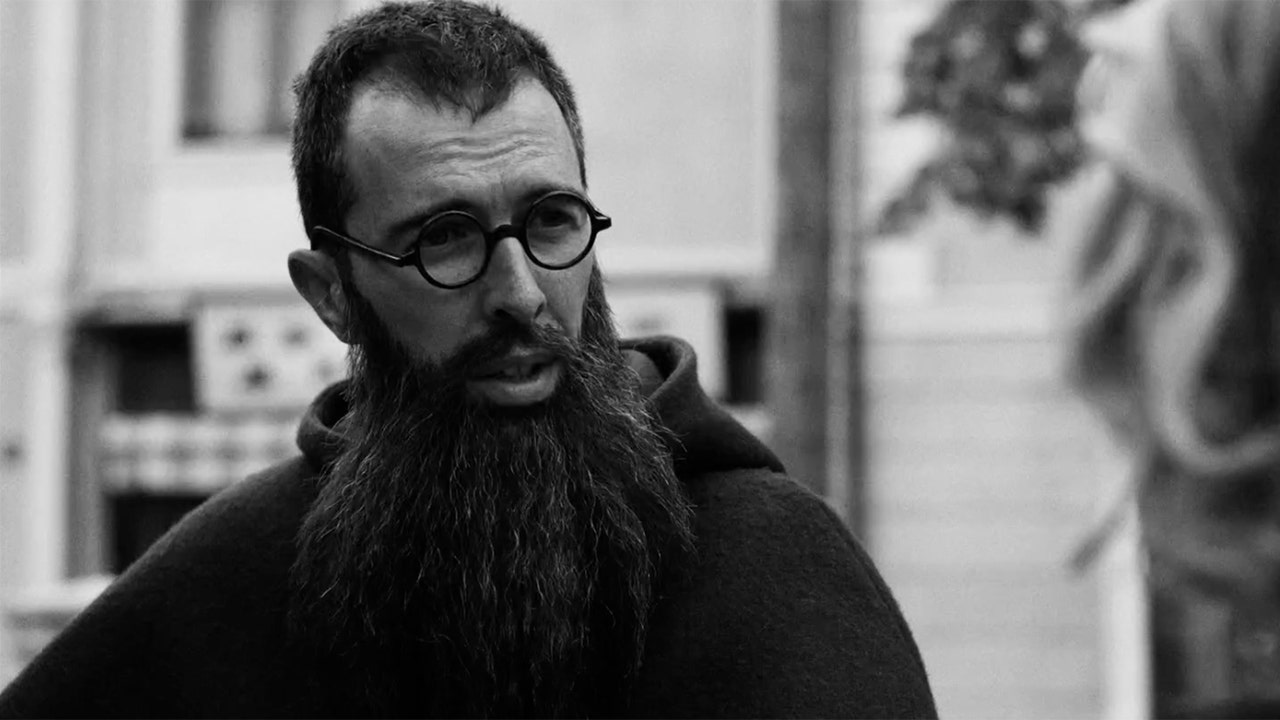
One of the 20th century's most renowned saints was St. Maximilian Maria Kolbe, a Franciscan friar who was killed by the Nazis in Auschwitz.
The latest installment of Martin Scorsese's "The Saints," streaming now on Fox Nation, focuses on a complex figure whose deep devotion to the Virgin Mary and bravery in difficult times is concealed behind his trademark glasses.
The future patron saint of prisoners, drug addicts, and journalists was born in Poland on January 8, 1894, as Raymund Kolbe, the second son of Julius Kolbe and Maria Dąbrowska.
At 9 years old, the boy's life underwent a significant change after he had a vision of the Virgin Mary.
While praying for guidance on his life's path, Kolbe received an offer from the Blessed Mother to choose between two crowns: one white for purity and one red for martyrdom. Kolbe opted to take both.
""I had to choose both," he told his mother in the episode."

Scorsese states in the show's narration that Kolbe's mother became a Benedictine sister and his father joined the Franciscans in Krakow.
After the start of WWI, his father left the Franciscans and joined the Polish legions. Following the war, the family discovered that he had been hanged by the Russians.
At the age of 16, Kolbe adopted the religious name "Maximilian."
Kolbe became a member of the Conventual Franciscans, a Catholic religious order, and studied in Lviv, which is now in Ukraine.
In 1910, Kolbe became Maximilian when he entered the novitiate at the age of 16.
In 1918, at age 24, Kolbe was ordained a priest after studying in Rome.
Kolbe founded the Militia Immaculatae in 1917 with the aim of converting sinners to Christianity through the intercession of the Blessed Mother, as Scorsese stated.
After being ordained, Kolbe returned to Poland and established a seminary, religious printing press, and publication, "The Knight of the Immaculata."
Scorsese stated that he traveled to Japan, established a mission and a seminary in Nagasaki, and published the Japanese version of the Knight of the Immaculata. Additionally, he spent time in India and founded a seminary there.
In 1933, Kolbe returned to Poland, the same year
Hitler's rise to power in Germany was accompanied by the persecution of Catholic clergy, Scorsese stated.

Scorsese stated that despite catching tuberculosis, Kolbe continued to evangelize.
Kolbe enlarged his media network, which was based in the monastery he founded, known as Niepokalanów.
Scorsese stated that Kolbe, in addition to his two publications, founded the first Catholic radio station in Poland.
He got a ham radio license and had the call sign SP3RN.
"Within weeks of Germany and the Soviet Union invading Poland, Kolbe was arrested by the German army and detained for three months," Scorsese stated.
Scorsese stated that while detained, Niepokalanów was ransacked, representing the "new reality of life under Nazi occupation."
Although his radio station and publication promoted anti-Semitic works, Kolbe himself encouraged others to view their Jewish neighbors as human beings.
"He's always your brother, no matter what his faith."
In the episode, Kolbe's neighbor, Mrs. Haba, inquired about the wisdom of providing bread to her hungry Jewish neighbors when they visited.
Kolbe reminded her, "It is crucial to remember that Jesus Christ, our Lord, was born a Jew, as was his Blessed Mother, the Immaculate. When a man comes to you with power, be cautious. When a man comes to you seeking food, treat him with kindness, for he is your brother, regardless of his faith or appearance. Keep this in mind."

Scorsese stated that during the war, Kolbe and his companions provided assistance and support to more than 3,000 displaced individuals, including 1,500 Jews.
In February 1941, Kolbe and others were arrested by the Gestapo and imprisoned at Pawiak in Warsaw, where they were tortured. Later, in May, Kolbe was transferred to Auschwitz and given the prisoner number 16670.
In Auschwitz, Kolbe remained a priest and faced persecution. Despite this, he earned respect among the other prisoners.
In July 1941, a prisoner disappeared from camp and was believed to have escaped.
"I'm a Catholic priest. I would like to take the place of this man."
The Nazi guards selected 10 individuals from a line to replace the escaped prisoner and informed them that they would be sent to a starvation chamber. Among those chosen was a Polish Catholic named Franciszek Gajowniczek, who protested that he had a spouse and offspring. Kolbe offered to take his place, which the guard agreed to.
"As a Catholic priest, I would like to replace this man," Kolbe stated.

"He has family, sir. I have none. Kindly, I wish to die in his place," he stated.
In the starvation bunker, Kolbe led the others in prayer. However, they eventually succumbed to starvation and dehydration.
On Aug. 14, two weeks after his arrest, Kolbe was still alive. The Nazi guards then ended his life with an injection of carbolic acid.

The Feast of the Assumption of Mary was the day he was cremated.
In 1971, Pope Paul VI beautified Kolbe, and in 1982, Pope St. John Paul II canonized him, as stated by Scorsese.
At age 9, Kolbe pledged to the Virgin Mary and was later given the titles of confessor and "martyr of charity," fulfilling his promises.
The man saved by Kolbe, known as Gajowniczek, was present at both his beatification and canonization as a guest.

"The Saints," a series on Fox Nation, showcases the lives and legacies of saints like Maximilian Kolbe, who embody tenacity, courage, and righteousness in the face of adversity.
For more Lifestyle articles, visit planetchronicle.net/lifestyle
Scorsese and his team journeyed over 2,000 years of history to explore the lives of eight extraordinary figures, including Joan of Arc, John the Baptist, Sebastian, Maximilian Kolbe, Francis of Assisi, Thomas Becket, Mary Magdalene, and Moses the Black, and their extreme acts of kindness, selflessness, and sacrifice.
Sign up for Fox Nation and start streaming "The Saints" series with a 3-month free trial using the promo code "SAINTS."
lifestyle
You might also like
- Post-inauguration, the surprising truths about DC travel costs.
- Melania and Donald Trump celebrate their 20th wedding anniversary: View the images.
- John Schneider, known for his role in 'Dukes of Hazzard,' remains steadfast in his belief: "God has a plan."
- Notre Dame football coach and Catholic convert is 'not shy about' the importance of faith.
- Trump confidant and unofficial spiritual advisor: "God is granting America another opportunity"

